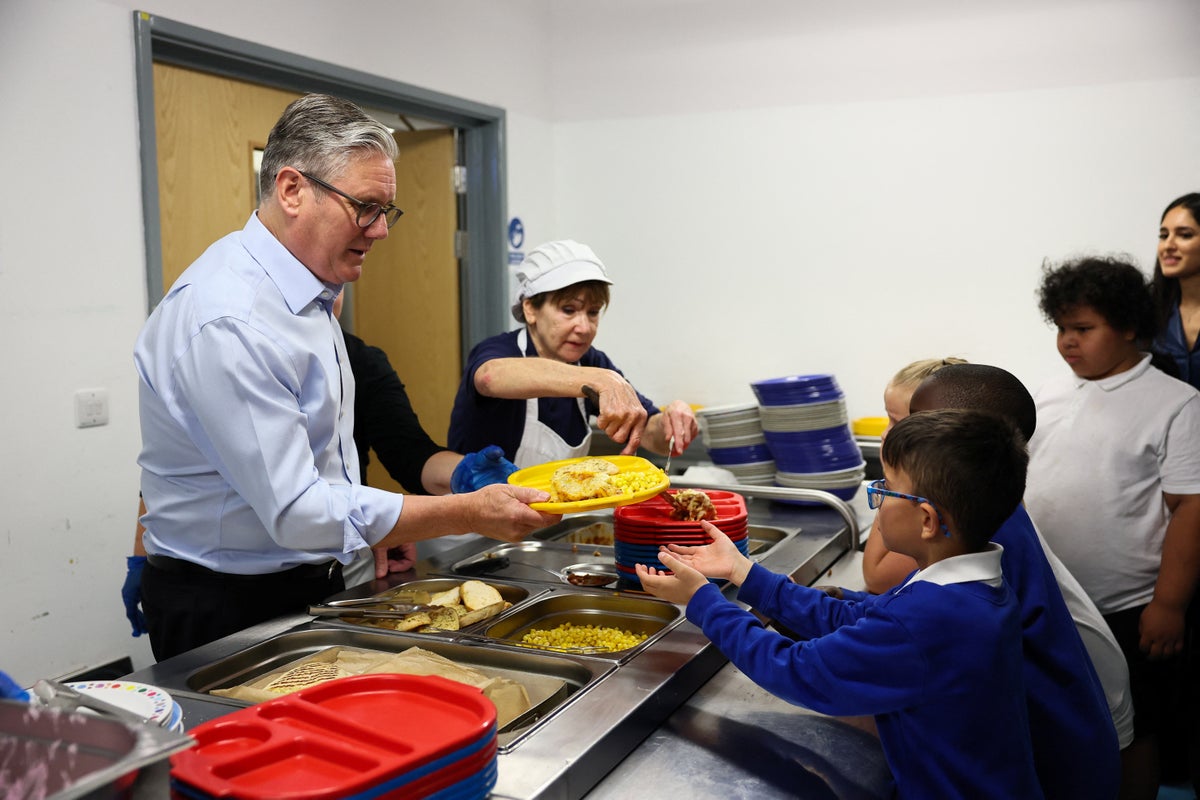
The Government should go further and introduce a national auto-enrolment system for all children eligible for free school meals to reduce “inequalities”, a think tank has said.
There is variation in free school meal registration practices across England, research by the Education Policy Institute (EPI) has suggested.
It comes after ministers set out plans to expand free school meals to all pupils in England from families on universal credit.
Currently, households in England on universal credit must earn below £7,400 a year (after tax and not including benefits) to qualify for free school meals.
The expansion of free school meals to all pupils in families on universal credit from September 2026 will make 500,000 more children eligible for free lunches, the Government has said.
Parents currently have to apply for their children to receive free school meals and eligible children are not automatically enrolled.
The paper, funded by The Nuffield Foundation, calls on the Government to introduce a national auto-enrolment scheme to ensure all eligible families are registered for free school meals.
It said: “Despite this expansion in FSM (free school meals) eligibility, without further action from the Government, children may continue to miss out on the free meals they are entitled to.
“The barriers to registration and differences in registration practices across LAs means children still face inequalities in access to free meals.”
The report added: “In terms of barriers families face in applying to FSM – including English as an additional language, stigma, confusion about eligibility – auto-enrolment would largely eradicate these issues.”
Despite efforts to boost registration, language barriers and a lack of digital access are preventing the meals reaching children that need them, it said.
An additional 77,700 children became eligible for free school meals in the past year, according to recent data published by the Department for Education.
More than one in four (25.7%) pupils in England were eligible for free school meals in January, the equivalent of 2.17 million children – up from 24.6%, or 2.09 million, in January 2024.
But the report from EPI – which is based on surveys and interviews with local authorities and multi-academy trusts in 2024 and early 2025 – found where a child lives or goes to school determines how hard it is for families to register for free school meals.
In some local authorities, parents are required to make their own application while facing significant barriers and if found ineligible at the time must reapply when circumstances change.
While in others, they use local auto-enrolment to proactively identify entitled children without relying on parents sharing details or making an application.
The report also found that some children who attend maintained nurseries before and after lunch are missing out on free meals to which they are entitled.
Dr Kerris Cooper, senior researcher for early years and inequalities at EPI, said: “Our research shows that while the extension of free school meal eligibility is a very positive step, more needs to be done to ensure that all children entitled to free meals can actually access them.
“First, there are still significant barriers for families to register for FSM, and where a child lives plays too big a role in their chances of being registered.
“Second, the youngest children, who face the highest risk of poverty, will not benefit from this expansion in eligibility unless all children attending early education are also included and settings are supported to deliver this.
“Introducing national auto-enrolment and including children in early education would enable this expansion in FSM eligibility to more meaningfully extend access to more children in poverty.”
Pepe Di’Iasio, general secretary of the Association of School and College Leaders (ASCL), said: “The expansion of free school meals, to include all children in households on universal credit, is a positive move that recognises there are children living in poverty who have been missing out.
“Moving to a national system of auto-enrolment would be the next logical step to ensure that everyone who is now eligible under the new criteria will actually receive a meal and the intended benefits.”
He added: “We see no reason why a national system of auto-enrolment cannot be established relatively straightforwardly.
“This is something that would make a big difference to vulnerable families.”
Last week, education minister Stephen Morgan told MPs in the Commons that the Government would be working to make it easier for people to apply.
He said the announcement on expanding free school meals was a “significant, straightforward process for parents to know whether they are eligible”.
A Department for Education spokesperson said: “Through our Plan for Change, this government has taken a historic step to tackle the stain of child poverty and spread opportunity – extending free school meal eligibility to all children in households on Universal Credit.
“This means over half a million more children will be able to access free meals from the 2026 school year, lifting 100,000 children completely out of poverty – and we will launch an upgraded eligibility checking tool next year to make it simpler than ever for parents to see if they can benefit.
“This forms part of our wider plan to put money back in the pockets of working families – with parents also set to benefit from our free breakfast club rollout and school uniform cost cap, helping them save up to £500 a year.”







